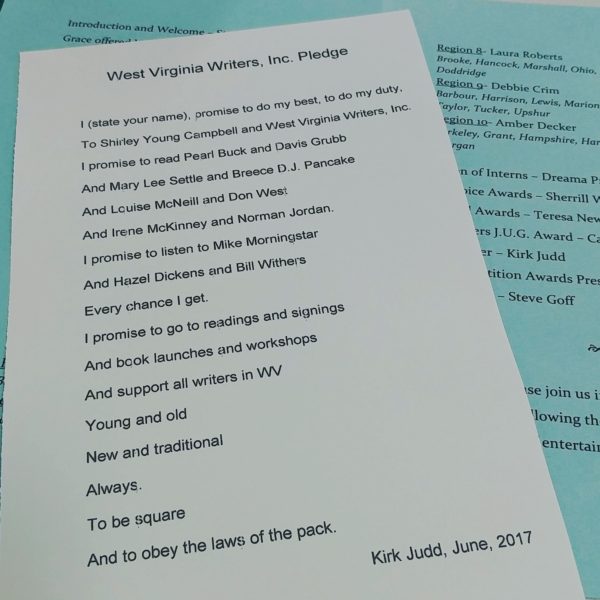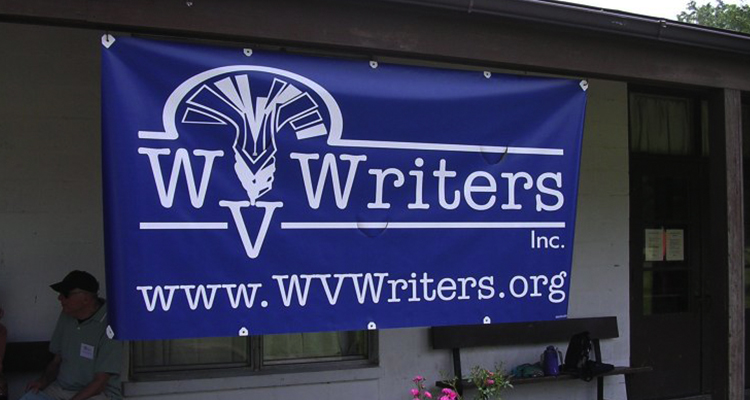On the second weekend in June, a pack of unique and wonderful people descends upon the Cedar Lakes Conference Center in the green hills of Ripley, W.Va. They’re artsy folk, young and old, with a common bond: the written word. These are the West Virginia Writers, and they’ve been coming together for 40 years to celebrate a love of both literature and the West Virginian way of life. West Virginia Writers is the largest writers’ resource in the state, consisting entirely of volunteers.
I’m a member of West Virginia Writers, and I serve as the organization’s representative for the northern panhandle area. My job is to raise awareness about WV Writers, but perhaps more importantly, to encourage the proliferation of writing here in our community. West Virginia is certainly not short on supply. You may know of Henry Louis Gates Jr., Homer Hickam, Pearl S. Buck, Jeannette Walls or Irene McKinney. The list goes on because, when it comes to literary talent, we’re running with the big dogs.
Eliot Parker currently serves as president of WV Writers, and he’s eager to get the word out about the mission and goals.
“Our organization has basically been founded on the idea or the belief that the written word is one of the strongest characteristics of all human endeavors,” he told me. “And our goal is really to expand and develop creative writing and professional opportunities for writers, and also to provide an opportunity for the state’s writers to connect with each other and with the literary community and the public at large.”
WV Writers have a presence at almost every literary event in the state. They show up at Morgantown poetry readings, Huntington open mic nights, the Lewisburg Literary Festival and Wheeling’s own Lunch with Books. In addition, you’ll find WV Writers mixed in with local groups like the Ohio Valley Writers.
Not only does it encourage the arts in West Virginia — something our state has struggled with, of late — but it also serves to connect writers with other writers. The writing life can be a lonely one. The tropes about writers locked away in offices and attics all day pulling their hair out by the roots isn’t all that inaccurate. The joy and struggle of writing is a kind of pain many people don’t understand. Sometimes the words don’t come. Sometimes the ideas don’t even come. The first draft is always rubbish, and the second and third drafts usually are too. There’s a certain irony in writing about the splendors and trials of life from a secluded room devoid of human contact.
Adding to that sense of isolation is West Virginia itself. A Martinsburg writer can’t exactly get together with a Bluefield writer for an hour of coffee. The mountains that define us also serve to divide us, geographically. That’s why literary events in Charleston or Huntington or Wheeling are so important: it’s a chance for us to connect with our kind, our tribe.
The annual West Virginia Writers’ Conference serves this same purpose. Once a year, we migrate to Ripley for three days of togetherness, support and learning. The first time I attended the WV Writers’ Conference, I knew nobody. Born a bit of an introvert and still a little shy, I worried about the things one worries about even as an adult: Who would I talk to, who would I eat lunch and dinner with, and would anybody want to be my friend?
As I checked in to the resort, a tall, kind man stood behind me. It was Marc Harshman, West Virginia’s poet laureate and author of both children’s books and books of poetry, including “A Song for West Virginia,” which was written for the state’s sesquicentennial anniversary. My kids knew Marc from his visit to their school, and I introduced myself. He was my first West Virginia Writers friend, and I’m proud to call him so. Of course, I met many friends who took me under their wing and welcomed me eagerly. Now, three years later, I look for their faces when I arrive in Ripley. And it doesn’t matter if I attend the conference with a group or solo; there’s a seat at every table, and everyone is warm and welcoming.
Eliot Parker said the same thing when I asked him what he thought newcomers could expect at their first conference.
“I think, first of all, you’re going to find a very warm, friendly, engaging environment,” he answered. “You don’t have to be a published writer. You don’t have to be even an amateur writer. I think you will find a variety of different workshops that tailor to just about every genre of writing that there is. And you get an opportunity to learn from award-winning published writers, both within our state and the whole country.”
What makes the West Virginia Writers’ Conference special is West Virginia itself. Last spring, I attended AWP, the Association of Writers and Writing Programs Conference. AWP is a monster machine, with hundreds of panels, hundreds of publishers, and thousands of people. The crowds made it difficult to forge any new networking connections, and it’s tough to remember faces in such a literary cacophony. More importantly, no common ground holds the attendees together. Simply being a writer isn’t enough to bond 10,000 people.
The West Virginia Writers Conference is like camp. You’ll encounter no jerks, no egos and no literary snobs. The annual writing contest winners are celebrated and honored. Good writing is acknowledged; great writing is awarded. And though the state’s geography might divide us the rest of the year, you’ll find that the Huntington writers share a jar of moonshine with the Wheeling writers. The Charleston poets listen to live bluegrass with the Charles Town poets. We are bonded by our West Virginian-ness.
In our state, that’s not a bond to underestimate. Our love of our home, despite all the negativity it endures from both the inside and the outside, emerges in our conversations. We are not only proud to be from West Virginia; we are all in love with West Virginia. And no matter how many times we land in the 50th spot on an unenviable list, we resist that label. We’re more than an opioid addiction. We’re more than an unemployment statistic or a color on a political map. This place is our bloodline. And that blood runs through the veins of this conference, too. Our state is our spectacular main character; it creates our narrative tension and our blessed resolution.
At every writers’ conference, I come away with something of value: a new technique, a business card, a signed book. When I leave Cedar Lakes, I do so with a renewed sense of community, of deep and enduring pride to be a West Virginian. From the hollows and panhandles of our state the writers come forth for this annual pilgrimage, and though it’s writing that brings us together, it’s our love of our way of life that we truly share.
Last year at the banquet we took an oath. We swore to support one another in literature and friendship, to remember the great authors who wrote before us:

And we remain a pack, as the pledge suggests. For 40 years, the West Virginia Writers have kept the torch burning in support of one another, of the story tradition. It’s one I’m so proud to be a part of.
For more information, visit www.wvwriters.org.
(Author Eliot Parker is the guest at Lunch With Books, noon, Tuesday, May 15, at the Ohio County Library. Parker will discuss Appalachian themes in fictional writing using examples from his books.)
• Laura Jackson Roberts is a freelance writer in Wheeling, W.Va. She holds an MFA in Creative Writing from Chatham University and writes about nature and the environment. Her work has recently appeared in Brain, Child Magazine, Vandaleer, Animal, Matador Network, Defenestration, The Higgs Weldon and the Erma Bombeck humor site. Laura is the Northern Panhandle representative for West Virginia Writers, a blog editor for Literary Mama Magazine and a member of Ohio Valley Writers. She recently finished her first book of humor. Laura lives in Wheeling with her husband and their sons. Visit her online at www.laurajacksonroberts.com.




